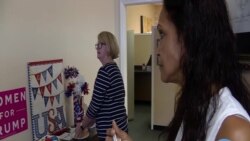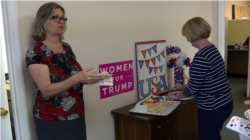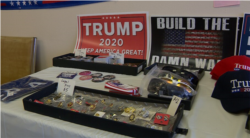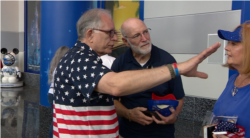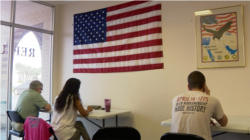In a small office in a strip mall in Seminole County, a suburb of Orlando, Florida, a group of Trump campaign volunteers takes a break after a morning of work. They gather around a cake, brought in to celebrate Donald Trump's recent 73rd birthday.
The volunteers focus on outreach, aiming to secure votes for 2020. Their leader is Linda Trocine, Chairman of the Republican Party of Seminole County.
An engineer by training who now works in real estate and a life-long Republican, Trocine, like many in her team, supports the president's economic and immigration policies and believes that only Trump delivers because as a businessman he has seen the effect of bad policies.
"He's the most pro American president we've had since Ronald Reagan," Trocine said.
Trocine's passion for Trump is emblematic of his hard-core true believers. Many are motivated by perceived attacks on their values and American way of life, and the believe that Trump is the only one strong enough to stand up and protect them.
'America First'
Trump supporters' sentiments of "love of country" mirror the president's frequent statements that he is putting "America First," which to his base also means "Americans First."
"We have opportunities in this country that other people don't," said volunteer and small-business owner Hillary Courson. "I think that there are people who would very gladly take those opportunities away from myself and from my family, and I'm not willing to let those go without a fight."
Thomas Fraser Pettigrew, Research Professor of Social Psychology, University of California, Santa Cruz, has done extensive research on Trump supporters. Pettigrew said that similar to Europe's far-right voters, Trump supporters have major grievances from perceived threats to traditional norms and values, economic changes and immigration.
Ty Patton, volunteer and retiree who fought in the Vietnam War with the Marine Corps proudly displayed his love of God and country on his chest, with a Statue of Liberty and American flag tie and a cross necklace. He calls America "the greatest country this world has ever seen".
"We give more than any other country, than all other countries, to the poverty around the world," Patton said. "And, for anyone to think that America needs to change, I just have a problem with that."
Concerns over racism
In October 2018 Trump declared himself a "nationalist", contrasting himself with the "globalist" previous administration whom he accused of putting other nations' interests ahead of those of the United States.
His populist rhetoric and protectionist policies are popular with his base but have raised concerns over authoritarianism, nativism and racism.
Vanessa Beasley, professor of presidential rhetoric at Vanderbilt University said that Trump is a master of tapping into this sense of nationalism, which previous presidents have been careful to walk a fine line on, to motivate his base.
"Part of the message is, there's one way to look American, there's one way to think as an American," she said. "And it's a very rigid notion of nationalism, which is a little unusual in a country that seen as much diversity and changes and demography as we have."
Will the base be enough?
Trump secured only 46 percent vote but won the presidency under America's electoral college system. His approval rating hovers under in the mid 40s, and recent polls suggest that he may be losing ground in three states that were key to his 2016 success; Michigan, Pennsylvania, and Wisconsin.
Trump retains a solid base of support from 89 percent of Republicans but whether they will be enough to deliver a second term may depend on whether Democrats are able to unify the majority of anti-Trump votes around their nominee.
"There are two ways the Democrats could reelect Donald Trump," said Whit Ayres, Republican strategist from North Star Opinion Research. "The first is to nominate some far left-winger or some very unpopular person who could not unite the non-Trump majority of the country. And the other way is to impeach Donald Trump and turn him into a victim."
In 1992 Bill Clinton was re-elected with 43 percent support. The same happened to Richard Nixon in 1968.
'120,000 requests'
Part of Trump's success with his base is convincing them that there are more of them than what the media and polls would report.
Maureen Bailey is part of the hundred or so who lined up 40 hours ahead of Trump's re-election campaign launch rally. "Do you think that people would be here since 2:30 in the morning, if those polls were correct?" Bailey said.
Trump frequently inflates the number of his base, part of the self-aggrandizing act he often displays in his speeches.
"You know if we have three or four empty seats, the fake news will say, Hey, they didn't fill it up,'" Trump said at his re-election launch rally. "They said, maybe we shouldn't go to Orlando, we should go someplace else. I said, no, go to Orlando. Not only did we fill it up, we had 120,000 requests."
According to official turnstile counts released by the city of Orlando, the rally drew 19,792 spectators, just short of the 20,000 capacity of the Amway Center.




